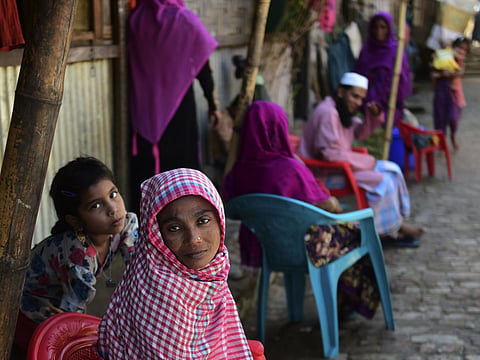Fomenting unrest and distrust
In Myanmar and Sri Lanka, the promotion of a divisive agenda through violence against minorities by thuggish groups such as BBS need to be controlled with an iron hand

Growing up, my recollection of Buddhism was that it reflected a message of peace and acceptance of all things. That image was further compounded by the sight of Buddhists dressed in yellow robes scurrying about peacefully and carrying out their daily chores without attracting much noise or attention. Buddha’s message of ‘Don’t commit any unwholesome actions, but thoroughly engage in wholesome actions. Subdue your mind completely. This is the teaching of the Buddha’, played itself well in the actions of his followers.
According to Buddhist faith, ‘the central message of the Buddha is based on the supreme assurance and compassion that we are all worthy of liberation just as we are. Whether we are saints or sinners, male or female, black or white, ignorant or wise, rich or poor, monastic or a lay person, believer or a non-believer, human or non-human, Amida, the symbol of the unseen caring spiritual force surrounding and penetrating us, ceaselessly works to liberate all beings like us from confusion and suffering into the substance of enlightenment and peace’.
Today’s reality, however, is a far cry from those childhood images. The ongoing genocide in Myanmar against the Rohingya people by a Buddhist-led regime, intent on erasing all presence of an ethnic group that follows another religion, is in total contradiction to what Gautama Buddha had preached so many centuries ago. What is more disturbing is that majority of Myanmar’s citizens who are Buddhist appear to support this genocide with their quiet assent. This includes no less a prominent figure than the 1991 Nobel Prize winner Aung San Suu Kyi who rose to prominence by her active resistance to the cruel and brutal dictatorship of the military regime ruling the country. She has been mysteriously silent on the current genocide taking place in her country!
In another nearby country, Buddhist terrorists have been creating mayhem for all other religious and ethnic groups, with much of that havoc leading to killings and driving people out of their lands. This has been happening in the island of Sri Lanka, a country where the majority are of Buddhist faith. Two years ago, the Sri Lankan government led by President Mahinda Rajapakse appeared to be nodding their head silently to the brutal antics of the Buddhist terror group, the Bodu Bala Sena (BBS) — a group that was actively engaging in promoting Buddhist interests above all others and engaging in subversive activities against other minorities.
At the time, Sri Lankan Muslims were being massacred by Sinhalese mobs led by BBS clergy members. Muslims’ properties were being looted and destroyed. Churches were being burned and their preachers hounded. Mahinda Rajapakse’s government had failed to protect Muslims. Muslim ministers and members of parliament were not in a position to press the government. The situation was deteriorating fast. Atrocities in Sri Lanka were soon attracting global attention for all the wrong reasons and Rajapakse came under fire for his failure to rein in these terrorist activities.
Following the defeat of Rajapakse in early 2015, the new Sri Lankan President Maithripala Sirisena sought to restore law and order in the country and beefed up efforts to bridge the growing sectarian divide. He made a passionate appeal for reconciliation, saying he was committed to the current process of constitutional reforms to address the concerns of minorities on the island, including Hindu Tamils, Christians and Muslims. “Freedom of following any religion has been ensured in Sri Lanka, as religious philosophies help people live more virtuous and disciplined lives,” he assured minorities, adding that “spiritual development and the moral development of people are indicators of the true development of a country”.
However, there have been several disturbing incidents involving Buddhist clergy espousing violence against other faiths. The scourge of racism has reared its ugly head yet again and is spreading fear and alarm in the country. These concerns have stemmed from the actions of two Buddhist monks in the north and east of the country over the past two weeks. Late last month, a writer on the scene, W.A. Sunil, stated that “the chauvinist campaign by Sinhala Buddhist extremists has intensified during recent months. Last week, in Batticaloa, in the eastern province, a Buddhist monk, a supporter of BBS, threatened an ethnic Hindu Tamil government village officer with bodily harm if he continued court cases against Sinhalese people. In another incident, police were compelled to arrest a Sinhala chauvinist week before last who had made similar threats against Muslims at a public demonstration in Colombo”.
Following these recent incidents, Human rights groups have urged the government to control the situation before it spirals out of control and reiterated their call that the government must make its policy towards reconciliation public and clear. Rajapakse has unsatiated ambitions to get back in power and will not resist resorting to using thugs like the BBS to promote his agenda of fomenting unrest and bringing down the present government.
Will Sri Lankans succumb to such divisive message and allow their country to hurtle towards the path of further violence and doom? Only the people of that country can answer that question.
Tariq A. Al Maeena is a Saudi socio-political commentator. He lives in Jeddah, Saudi Arabia. You can follow him on Twitter at www.twitter.com/@talmaeena.


